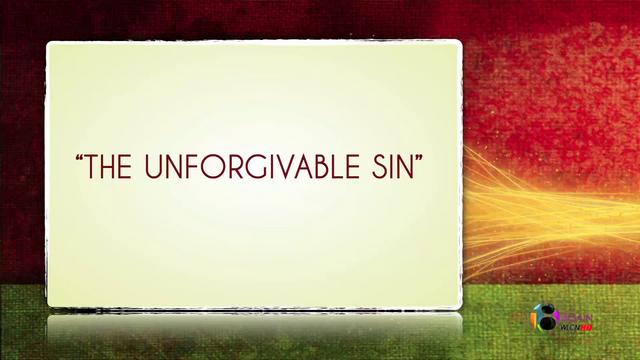When Yeshua was on the earth He spoke the following words:
Truly I say to you, all sins shall be forgiven the sons of men, and whatever blasphemies they utter; but whoever blasphemes against the Holy Spirit never has forgiveness, but is guilty of an eternal sin. – Mark 3:28-29
What does it mean to blaspheme against the Holy Spirit?
How exactly does someone commit an “eternal sin?”
The Context of Blasphemy
To begin to understand this radical statement by Yeshua it is important to understand the context in which He spoke these words. The verses found in Mark 3 above are paralleled in Matthew 12:31-32. It is helpful to look at both of these accounts to understand the circumstances surrounding the situation when Yeshua spoke these words.
Yeshua healed numerous people during His short years on this earth (Matt. 12:15). At one point, a demon-possessed man, who was both blind and dumb, was brought to Yeshua and He healed him. The people were amazed at this miraculous healing and wondered if Yeshua could be the Messiah, the son of David (Matt. 12:22-23). While the people were talking amongst themselves and wondering if Yeshua was the Messiah, the Pharisees were quick to attribute Yeshua’s power to someone other than God. They claimed, “He is possessed by Beelzebul,” and “He casts out the demons by the ruler of the demons” (Mark 3:22). The people saw the miracles and attributed them to Almighty God whereas the Pharisees were attributing the miracles by the hand of Yeshua to the ruler of demons.
The Focus of Blasphemy
Were the people right in assuming that the power at work in their midst was from God or was the real source from Satan and his demons? Yeshua knew the thoughts and accusations being spread about in the crowd and He wasted no time in getting to the heart of the issue. Yeshua boldly stated:
Any kingdom divided against itself is laid waste; and any city or house divided against itself will not stand. If Satan casts out Satan, he is divided against himself; how then will his kingdom stand? If I by Beelzebul cast out demons, by whom do your sons cast them out? For this reason they will be your judges. But if I cast out demons by the Spirit of God, then the kingdom of God has come upon you. – Matt. 12:25-28
Yeshua destroyed the accusations of the Pharisees by exposing a weakness in their argument, Satan does not cast out Satan! Satan does not empower for good and for life but rather for death and destruction. Yeshua even went so far as to turn the Pharisees’ own argument against themselves asking the question, “If I by Beelzebul cast out demons, by whom do your sons cast them out?” It was a valid question that the Pharisees obviously could not refute.
After exposing the weak argument of the Pharisees Yeshua then asked a rhetorical question that would ring in the ears of both the Pharisees and the people: “But if I cast out demons by the Spirit of God, then the kingdom of God has come upon you” (Matt. 12:28). Yeshua made it clear in so many words that the miracles that He was performing were not the work of Satan or any demons but rather the work of the Spirit of God and therefore, the “kingdom of God” was being displayed in their midst.
The Root of Blasphemy
This is the context in which Yeshua spoke regarding this subject of blasphemy and the unpardonable sin. Yeshua spoke directly to those who had taken the miracles that He had performed by the Spirit of God and attributed this power to Satan. Yeshua warned them that they were treading on dangerous ground. Yeshua declared to them that the Spirit of God was working through Him and if they attributed this power to Satan, Beelzebul, or some demon than they were blaspheming God Himself and this was an unpardonable sin.
When a person sees the power of God displayed before their very eyes and rejects it, they are rejecting the very person of God. God tells us that there is no forgiveness available to this person because they are blaspheming the Holy Spirit of God.
Blasphemy & The Unpardonable Sin
This subject of blasphemy and the unpardonable sin is actually a clear teaching in this week’s Torah Portion (Num. 13:1 – Num. 15:41). In chapter fifteen of Numbers God gave Moses instructions about sacrifices regarding several different sins that were considered unintentional, however, towards the end of this chapter God stated that there is a sin which is not forgivable:
But the person who does anything defiantly, whether he is native or an alien, that one is blaspheming the LORD; and that person shall be cut off from among his people. Because he has despised the word of the LORD and has broken His commandment, that person shall be completely cut off; his guilt will be on him. – Num. 15:30-31
The word “defiantly” used in this verse comes from the Hebrew expression “יד רמה” or “yad ramah” meaning “a high hand” or “a raised hand” and signifies one who does something in arrogance, with no fear of God, showing impudence, and seeking to draw attention to oneself while opposing the law. The person who acts defiantly, whoever he or she is, is guilty of blasphemy.
The word for blasphemy used in this verse is the Hebrew word “מגדף” or “megadef” and means to revile, reproach, or blaspheme. According to my research, this word “megadef,” or some form of it, only appears seven times in the Old Testament Scriptures (2 Kings 19:6. 19:22. Isaiah 37:6. 37:23. Ezekiel 20:27. Psalm 44:16). The first time that this word appears in the Bible is here in Numbers 15:30. God Himself gave us the clearest definition possible of what it means to “blaspheme the LORD,” that is to defiantly act in a way that is contrary to the word of the LORD and to reject the word of the LORD.
Examples of Blasphemy
At first glance it seems like we have all committed “blasphemy” against the LORD by acting defiantly in one way or another, however, I believe there is a clear difference between committing a known sin and defiantly acting against the word and revelation of God. There are two clear examples of blasphemy in this week’s Torah Portion.
The first example of blasphemy occurs immediately after the verses that speak of blasphemy:
Now while the sons of Israel were in the wilderness, they found a man gathering wood on the sabbath day. Those who found him gathering wood brought him to Moses and Aaron and to all the congregation; and they put him in custody because it had not been declared what should be done to him. Then the LORD said to Moses, “The man shall surely be put to death; all the congregation shall stone him with stones outside the camp.” So all the congregation brought him outside the camp and stoned him to death with stones, just as the LORD had commanded Moses. – Num. 15:32-36
God’s law was clear, “don’t work on the Sabbath,” but this man in defiance went out and gathered wood on the Sabbath. There was no sacrifice of atonement for him and he was immediately judged because this man had blasphemed the LORD by his defiant actions.
The second example of blasphemy occurs in the preceding chapters in Numbers and begins with this statement from the LORD:
Then the LORD spoke to Moses saying, “Send out for yourself men so that they may spy out the land of Canaan, which I am going to give to the sons of Israel; you shall send a man from each of their fathers’ tribes, every one a leader among them.” – Num. 13:1
We all know this story. God commanded Moses to send out twelve spies to spy out the Land that He had promised to give to the Israelites. God’s word was clear, He was going to bring the Israelites into the Land and have them destroy the current inhabitants. The spies were sent out, they toured the Land, and then they returned.
When they spies returned they came to Moses, Aaron, and the congregation and they testified of the Land’s goodness to Moses: Thus they told him, and said, “We went in to the land where you sent us; and it certainly does flow with milk and honey, and this is its fruit. Nevertheless, the people who live in the land are strong, and the cities are fortified and very large (Num. 13:27-28). The spies saw the goodness of the Land but they were intimidated by the opposition.
The English word “nevertheless” comes from the Hebrew words “אפס כי” or “efes ki.” The Hebrew word “efes” means “zero” or “nothing.” Taken in context we can understand that the ten spies were declaring the following: “Yes, the Land is a land flowing with milk and honey but it is meaningless since the giants are there and we’ll never be able to conquer their fortified cities.” This is the essence of what they were saying and by their words and actions they were rejecting the word of the LORD.
We all know that Caleb and Joshua stood out from the other ten spies by speaking words of faith: “Then Caleb quieted the people before Moses and said, ‘We should by all means go up and take possession of it, for we will surely overcome it’” Num. 13:30. And later in this same account it is recorded:
Joshua the son of Nun and Caleb the son of Jephunneh, of those who had spied out the land, tore their clothes; and they spoke to all the congregation of the sons of Israel, saying, “The land which we passed through to spy out is an exceedingly good land. If the LORD is pleased with us, then He will bring us into this land and give it to us—a land which flows with milk and honey. Only do not rebel against the LORD; and do not fear the people of the land, for they will be our prey. Their protection has been removed from them, and the LORD is with us; do not fear them.” – Num. 14:6-9
The other ten spies, however, spoke a contradictory message which influenced the whole congregation: “But the men who had gone up with him said, ‘We are not able to go up against the people, for they are too strong for us’” (Num. 13:31). The end result was that the people believed the words of the ten spies and chose not to believe the words of God.
The message of the ten spies was defiant and blasphemous. The Israelite people were led astray from following the word of the LORD and God was ready to destroy the whole nation (Num. 14:11-12). Moses interceded on their behalf and God agreed to pardon them (Num. 14:13-19). Even though God pardoned the children of Israel He declared that they would never enter the Promised Land, only their children would.
Although God pardoned the congregation as a whole, a different fate met the ten spies who gave the bad report:
As for the men whom Moses sent to spy out the land and who returned and made all the congregation grumble against him by bringing out a bad report concerning the land, even those men who brought out the very bad report of the land died by a plague before the LORD. (Num. 14:36-37)
These ten spies knew the word of God. They knew the promises of God to give the Land to the people and to strike down their enemies. They had seen the power of God both in Egypt and throughout their desert journeys for approximately the past year and a half. The words they spoke to the congregation were in defiance to the word of God. They were blaspheming His name by denying His power and ability to accomplish what He said He would do. They acted and spoke against the very words of God and I believe that this was blasphemous in the sight of God. There was no pardon for their sin and they were struck down before the LORD.
Blaspheming the Holy Spirt Today
I believe there is much to be learned from meditating on the Scriptures mentioned above and studying each one in context as we have done here. God alone is the judge of our spirits and we need to be careful to not take His place in judging others in this area of blaspheming the Holy Spirit. We have enough to be responsible for as we consider our own lives.
In conclusion, I believe that there is a good New Testament warning for us all regarding this subject of blaspheming the Holy Spirit found in the book of Hebrews:
For in the case of those who have once been enlightened and have tasted of the heavenly gift and have been made partakers of the Holy Spirit, and have tasted the good word of God and the powers of the age to come, and then have fallen away, it is impossible to renew them again to repentance, since they again crucify to themselves the Son of God and put Him to open shame. – Hebrews 6:3-6
When we have tasted and come to know the power of God by His Holy Spirit and His holy Word, we have a responsibility to believe in Him and walk in faith in His Word. To reject this truth is to reject God Himself. This is what it means to commit the eternal sin of blasphemy.
A clear picture to distinguish a forgivable sin from the unforgivable sin of blasphemy is demonstrated by the lives of Peter and Judas. Peter denied that he knew Yeshua three times (Matt. 26:69-74) but repented and was restored to fellowship with Yeshua ((Matt. 26:75. John 21:15-22). Peter struggled in his faith because of fear but continued to believe. Judas, however, saw the power of God and witnessed the display of the Holy Spirit in the life of Yeshua for three years but then he completely rejected and betrayed Him (Matt. 26:14-16). There was no room for repentance for Judas and his end was death (Matt. 27:3-5).
Truly I say to you, all sins shall be forgiven the sons of men, and whatever blasphemies they utter; but whoever blasphemes against the Holy Spirit never has forgiveness, but is guilty of an eternal sin. – Mark 3:28-29
Yeshua’s words about blasphemy are piercing to the soul (Mark 3:28-29) and I believe that He wanted to communicate this to the Pharisees who were rejecting the power of the Holy Spirit working through Him. Let us learn from those who have gone before us and not be disbelieving but rather believing and trusting in the God of heaven and earth and in Yeshua the Messiah.
“But, beloved, we are convinced of better things concerning you, and things that accompany salvation” (Hebrews 6:9).
So then, my beloved, just as you have always obeyed, not as in my presence only, but now much more in my absence, work out your salvation with fear and trembling; for it is God who is at work in you, both to will and to work for His good pleasure. Phil. 2:12-13
Let us continue trusting in our God through faith in Yeshua the Messiah and work out our salvation with fear and trembling.
Shabbat Shalom!
If you enjoyed reading this article, we invite you to sign up for our weekly Torah Portion commentary on the sidebar to the right.
Torah Portion: Num. 13:1 – Num. 15:41
Hafatara: Joshua 2:2-24
Return to Torah Portion Homepage
Copyright Jewels of Judaism. All rights reserved 2015






I’ve committed this a few weeks ago by sinning against the Holy Spirit’s conviction in my head. I told myself that “it’s not the blasphemy with no forgiveness and i will feel guilty and confess after since I don’t intend to do it again.” After that I’ve went through I tormenting week with horrible thoughts attacking me. I prayed that He’ll save me from them and they stopped. I prayed and He revealed to me that what i did was based on pride and presumptuous and i missed the most important commandment of all. I’ve been humbled by that and asked Him to forgive me for what I’ve done. I felt much closer to Him since then and i thought my faith was strong but i kept being reminded of it so much that I’m struggling to believe. This is the 2nd article I’ve came across that explains blasphemy as such a sin. I don’t know what to do anymore and need help.
Thank you for your honesty in sharing your situation. We are all sinners in need of the forgiveness and salvation that is only found in Yeshua. We also need other believers in our lives on a consistent basis to work through our spiritual thoughts and to be strengthened in our inner spirits. Repentance, restoration, and walking forward in worship with other believers is the best way to keep on the path of God. Blessings
Thank you! I certainly haven’t been close with others in the faith but now that i want to, these thoughts keep condemning me and i feel stuck in a paradox. I want t believe that I am forgive because of His great mercy but when doing that, I also feel like I’m making Him a liar by believe He forgave my blasphemy. How must I deal with this?
I want to encourage you to make an effort to be in regular fellowship with other believers. We all need to be reading the Word of God daily and hearing the Word of God taught on a regular basis. It is the reading and hearing of the Word that constantly reminds us of the truth of who God is and of our identity through the sacrificial blood of Yeshua. We also need that regular fellowship and worship in the Spirit of God. So please make an effort to worship with others and commit to regularly being a part of this fellowship on a weekly basis. May God bless you and give you peace!
Amen
Dear Daniel,
I thank Adonai for empowering you to boldly teach His truth: “For I am not ashamed of the Gospel, for it is the power of God unto salvation to all who believe, to the Jew first and then to the Gentile” (Romans 1:16).
May Adonai mightily use you to lift the veil from the eyes of the presently unbelieving physical descendants of Abraham, that they may cross over from death to life, that Yeshua HaMaschiach may indeed be glorified among every tribe, tongue and nation. Maranatha!
I am your brother in Yeshua HaMaschiach, by His grace alone, through faith alone, in the Messiah alone.
Sal
Dear Sal,
I appreciate your encouraging words. I’m grateful to be able to share the truths that I learn via this website. May God use it all for His glory and for the salvation of Jew and Gentile alike.
Your brother in the Messiah,
Daniel
Now I have more specific insights about this subject. Thanks Daniel for explaining with verses and details. Shabbat Shalom!
Hi Yazmin,
I’m glad you found this article helpful. It is definitely not an easy subject!